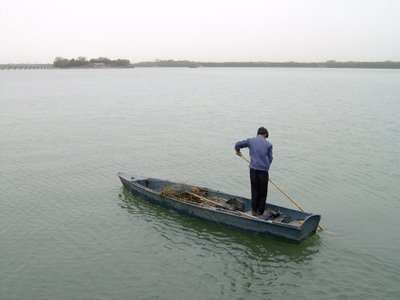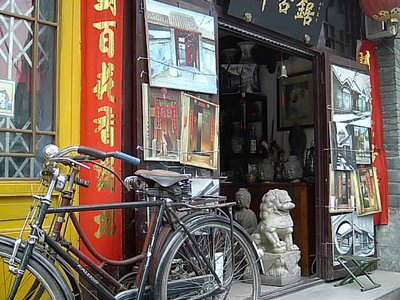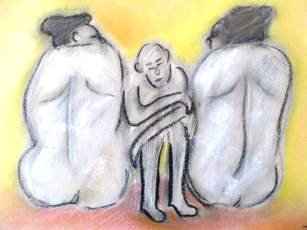Somebody sent me an email with a very blunt question: You're a writer, so where's your real writing? They meant it in the nicest possible way, I'm sure.
My blog's not enough to make me a writer?
I pondered this, and then thought, 'OK. Why not put something out there.'
Here's a bit from the second novel I'm trying to work on (three draft chapters and counting), without even knowing if the first one will ever get published.
Your comments will be most welcome. Sorry the blog format gets rid of paragraph indentations.
Chapter 1
Just a couple of strides away from the main entrance to The
Irish Times - the sight of which made her gut tighten - Myra
Dillon turned to see that her man had stopped and splayed
himself up against a large metal lamppost. His face shone as
crimson as the beetroot that she’d earlier diced up for lunch
and then wept over. She would’ve gone to him to make him lean
forward, so he could find his breath again and stop his
wheezing, but she was too distracted by the fierce hope that
his discomfort might make him change his mind about his two
o’clock appointment.
‘Could you not be slowing yourself down?’ he growled at
her, ‘rushing away in front of me like a thievin’ gypsy.’ He
coughed like it were a murderous yell, spitting a mix of beer
and bile onto the pavement. ‘You’ll be the bleedin’ death of
me, Myra.’ He cut the air with his turnip fingers.
She kept her face still, just so, gently reaching up to
check that her scarf – bought for €1.99 the day before –
hadn’t twisted itself around. She fastened the top button on
her cardigan of baby-blue, and then caught sight of herself in
a pub window.
She decided she wouldn’t answer him. She would
seek refuge there in her reflection, imagining that she had
her knotted hair done, and the cardigan could at last be given
to the Sisters of Mercy. She leant down to scratch the back of
her leg through her stocking, the whole time watching how her
movement looked in the window. Sadly, she saw there was no
going back on the dropping of the shoulders and her mouth had
a sour twist to it. A nice cold glass of scotch came out
through the window and poured itself down into her panting
chest.
‘For the sake of heaven,’ he blurted. ‘Myra!’
She looked back towards him and smiled. ‘We’ll be late,
Selwyn, and then you’ll go blaming me. Pick yourself up now.’
She nodded slightly between the smiles, a simple but effective
way to reassure him, to ensure he didn’t kick a real wobbly.
‘We’re almost there now.’
He managed the rest of the distance awkwardly, the weight
of his stomach pulling him forward, almost making him jog, his
feet hitting the pavement at hilarious angles.
Dublin was doing its best to hold on to its miserly ration
of September warmth, but a bitterness was reaching across the
tin-foil sky, trying to rally a wind or a bucketing rain.
Everyone knew it, even the birds. Dash about and get
everything done while things are still clear and dry. The
cheerful colour of the passing buses – vanilla yellow and two
shades of lolly blue - just weren’t working.
Myra said, ‘There Selwyn. We’re there now.’
‘You’ll be the bloody death of me,’ he mumbled. He put a
shaking hand on her shoulder, which unsettled a sleeping
memory: the gesture used to be something affectionate, but now
it was just to make sure he didn’t tip himself over in public.
He looked at the people bustling past him, racing for their
bus at the other end of D’Olier Street. His dark, frightened
eyes grew wider, as though he saw a street full of noisy
convoys of invading troops.
She could tell he was trying to make out if anyone was
staring at him, chuckling at his laughable state. ‘No one’s
interested in you, Selwyn. Let’s get you onto a seat inside.’
A springy, chatty man who introduced himself as Tiny Sung
Sue - or so it sounded - came out to meet Myra and Selwyn at
the reception desk. He kept sticking out his chin and raising
it up like a bucking horse, apparently trying to free his
irritated neck from the noose-like grip of his collar and tie.
Between mouthfuls of his collapsing tuna and mayonnaise
Sandwich (Myra could smell the ingredients) he laughed
awkwardly, shared hard-to-understand anecdotes, looked at his
watch. 'I was in Hong Kong before I came here,' he tweeted,
looking disappointed that Selwyn had taken more interest in
the fancy water cooler by the door. 'I really love this city.
Something's really going off here.'
Myra worried that Selwyn might not answer. 'They say
Dublin’s multi-culture now,' she said gingerly. 'Good for the
young ones, I suppose.' She didn't quite know why she joined
up those two thoughts, but it certainly did the trick in
making Selwyn snap back into focus.
'I just want to know why I wasn’t given a bleedin
interview, let alone a letter or call' he snapped. 'That's
all. A man deserves a bloody explanation.'
'I see,' said Sung Sue. 'Best we all go through to where we
can talk.'
He took them down a long corridor, past chaotic
rooms where trendy young people hugged phones under their
chins or peered into computer screens, looking bewildered or
bored. Myra wondered if she might see someone famous, perhaps
even the nice young fellow who wrote the gardening column.
Sung Sue said, 'I think there's been a misunderstanding, but
we're happy to put things straight.' He biffed the crust of
his sandwich into a bin and picked up a large tray of bulky
mail left on a crowded desk.
Myra was resentful that Selwyn had kept his hand on her
shoulder, pushing her forward as though she were the leader of
the delegation. She knew very well what the nice Tiny Sung Sue
was going to say; she'd been able to figure it out right from
the start. She felt an overwhelming desire to take a risk and
turn on Selwyn there and then, tell him that he was a fool and
once again he was going to cause a scene at which people could
snigger. This latest spectacle, to make things worse, was
going to be performed in the fine corridors of a fine
newspaper, and the young people there on the phone might even
be forced to write something about it. The whole of Dublin
would belly-laugh collectively at the latest shinnanigans
of Selwyn Dillon. She dropped her shoulder so his hand fell
away from her, but that only made him dig her in the middle of
the back with his other hand.
Once they were sitting on the posh leather sofa in a room
that had Assistant Editor on the door, Sung Sue said, 'What
did you think we meant by the term “crime correspondent” when
you saw it in the paper, Mr Dillon?' He played with his watch.
Myra offered Sung Sue a knowing smirk, very discreetly, in
the hope that he wouldn't think she was a halfwit as well. He
just looked blankly at the pair of them. Myra took in his
perfect dimples, his pearl-coated teeth, his appealing long
fringe and green eyes. She normally didn’t find Asian men
appealing, yet there were the odd exceptions. She pulled on a
small curl of hair that loitered down in front of her
face. She crossed her legs and then bounced her suspended foot
up and down, marking the seconds during which Selwyn was
saying a big fat nothing. She folded her arms and then tried
to communicate to Sung Sue with her eyebrows: she was on his
side, not Selwyn’s. If she hadn't agreed to come along and
sit there with her husband, she wanted to tell Sung Sue, then
there would’ve been a scene - and it wouldn't have been
pleasant.
'Are you having me on?' blurted Selwyn, standing up. His
arms rose at the sides, like he might take off for an aerial
attack. 'I'm not a bloody idiot.' He was doing his best to
stop making idiot sound like eejit, having read somewhere that
foreign language students were struggling to understand the
locals. He still hoped he may be able to cash in on the idea
of giving conversation lessons to Asian students, just as his
friend Tom was doing for a kidney-warming nine euros an hour.
Myra squeezed her arms tighter into her chest and looked
down at the carpet. 'Don't get angry now, Selwyn.'
'He's making out I'm a bloody eejit - idiot!'
'Don’t be daft. He is not.'
'He bloody is. Him and his bloody yobs. It's just a rag,
this is. Nothing bloody special about this outfit.'
'I tried to tell you.' Myra kept looking down at the
carpet.
'What did you say?'
'I tried to tell you what it was. That's all.'
Selwyn was silent for a moment and then said, 'Crime
correspondent? Course I know what that bloody well means.'
Sung Sue carefully slipped in behind his desk, creating
more space between himself and Selwyn. 'You needed to have a
journalism background. We wanted a journalist ... to write
articles.'
'I knew that,' said Selwyn, suddenly looking vacant.
Myra wanted to yell out that he was lying. He hadn’t known
that at all.
'You don't have a journalism background,' said Sung Sue,
quietly, finally looking at Myra for backup.
She could see that Sung Sue was looking upon her with pity.
He was looking at her gloomy-coloured scarf; the thick, plain
dress that looked like carpet underlay; her shoes made famous
by Catholic nuns; the cardigan and its tiny balls of overuse,
which were now too numerous to be successfully culled. The
last time Selwyn had given her money for an item of clothing
he'd insisted on choosing it himself, from the op shop at the
end of their street. She'd pleaded with him to let her go to
Arnotts, but he'd told her he wouldn't let his money be used
to ‘prop up the big conglomerates’ (that was one of the many
things he’d heard on talkback, and he repeated it to whoever
would listen). She hated the way she looked. She dreamed
of the day she could pay for some colour through her hair, or
wear an outfit that hadn't been cleaned out of a dead widow's
closet.
She decided to take a risk, to win back some of her dignity
in front of this nice young man from Hong Kong, who might just
be thinking they were both losers. 'Selwyn thought you wanted
someone who grasses on crims,’ she said with conviction, but
then wondered whether it might’ve been too informal to use the
words grasses and crims. ‘He thought you were advertising for
someone who gets paid for tips and things.'
'I thought no such thing,' Selwyn protested, his eyes
bulging to bursting point. 'You can shut it, right?'
She whispered. 'A correspondent’s not the same as a rat,
Selwyn. I tried to tell you. Papers don't go advertising that
as a job.'
'No, we don't,' said Sung Sue.
She went all warm on hearing that, confirmation that he
hadn’t jumbled her up with her husband. Selwyn was standing
out on the stage on his own, his costume coming unstuck,
everything revealed. The warm feeling lasted only a matter of
seconds though; Selwyn's hand came down on the back of her
chair, causing her to jolt forward. It wasn't a hard slap. It
never was. It was the usual warning that boundaries had been
stepped over.
Sung Sue didn't say anything. He stayed behind his desk and
kept his hands together, clearly at a loss to know what to
do. Myra didn't want a scene. Already she'd seen a few faces
popping up in the small glass window in the door, eagerly
curious about the raised voices. She decided she would do her
best to get Selwyn to leave. The point about the advert had
been made - albeit repeated. Selwyn wouldn't want to be
humiliated with further questions and explanations. The
charade had gone on long enough.
Like with all of these situations - when Selwyn embarrassed
her and made her despise him because of his behaviour - it
wasn’t long before she was overcome with an enormous feeling
of compassion for him. As they hobbled towards the reception
in silence, she wanted to tell him she loved him and that he
shouldn’t let himself get upset. She genuinely felt sorry for
him as she watched him stumble into the walls. He muttered to
himself as he tried to right himself.
Out in the street, as they both looked up to see how the
sky had now completely closed over with purple clouds, Selwyn
said he wanted to get a taxi home instead of getting a bus.
She knew he was seriously dejected; he rarely suggested
getting a cab. ‘I just want to be at home,’ he mumbled.
Myra went into automatic mode, wanting to make things
easier for him and jolly him out of the black mood he was
falling into. Out of the corner of her eye though, just as she
was saying something light and irrelevent, she spotted a sign
on a window over the road. Letting Selwyn move off down the
street a bit, she read the words to herself several times, to
make sure she’d understood the meaning of it. The more she
read the words, the stronger her feeling that the sign was
speaking to her. She took in the whole window and the
building, making a mental note of the street number. She
turned to see that Selwyn had already flagged down a taxi. As
she hurried to catch him up, she couldn’t help but let the
words repeat themselves in her head. They seemed to dance at
the front of her mind, everything else in there forced to shut
up, sit down and let the exciting new performance continue
without interruption.
* * * * *
In the customs hall at Dublin Airport, Father Xavier Duval
reset his watch, in exact synchronisation with the large
electronic clock on the wall. He felt ropy after his easyJet
flight from France, but prepared himself for another big
effort, pumping up his chest with the soggy, conditioned air
that he wasn’t used to. He headed for the baggage carousel,
all of a sudden nervous about what he was doing and why he was
doing it. He was also anxious to avoid a very loud girl from
Galway, named Pinky, who’d sat next to him on the plane. She’d
talked non-stop in frightening decibels about her summer
escapade with a ‘beefy’ Frenchman on the shore of the big lake
at Annecy. Father Xavier regretted that he’d taken off his
white collar, black shirt and pants at the airport in Lyon. He
figured that if she’d known she was talking to a priest she
might’ve tamed herself; then he wondered if that might’ve just
made her worse. Her nose studs and exposed beer belly had
troubled him, to say the least.
‘Hope you have a grand time in Dublin,’ she yelled out from
behind her backpack. ‘Be sure to climb the Guiness Storehouse,
over there on the wall.’ She pointed to a large tourist photo.
‘Thank you very much,’ he said. He knew his spoken English
was too forced, too controlled. He hadn’t spoken it for such a
long time, and he worried the words wouldn’t come out in the
right order. ‘Good bye. Enchanted to meet you.’
She offered him a warrior’s roar, as her rugged Celtic
ancestors had probably done in many a battle, and made
exaggerated OK signs with both of her chubby hands. He saw
then that a g-string rose up above the back of her baggy
trousers. He worried about where Pinky had come from and where
she was headed.
After flashing his passport under the nose of a
disinterested customs officer, he was out in front of the
airport trying to find a cab. He was advised by a man with a
black cap to take what sounded like ‘an irreparable carrier’,
and make his way to the official taxi rank. It was only after
a few minutes standing in a breeze full of dust and fumes from
passing buses that he realised he’d misheard the word
‘reputable’.
Father Xavier put his bag onto the back seat of a large
London-style cab and said, ‘Would it please be possible to be
taken to the centre of the city.’ He knew he sounded uptight.
‘I’ll take ya whereever ya fuckin well like.’
In the awkward silence that followed, Father Xavier thought
about the madness of the past few days, the ducking and diving
to avoid members of his parish at Fregny, near Saint Etienne,
and the attempt to pretend that everything had been as it
should be. His housekeeper would arrive at the presbytery the
following day and discover his absence. She would know
something was amiss; he’d always informed her of his small
trips to visit family in Paris, or down to the coast for short
stays at the church retreat at Cassis.
He sighed heavily, a colossal feeling of tiredness pushing
down on his shoulders and a sharp headache pressing into the
back of his eyes. He thought about the massive number of trips
he’d been forced to make to neighbouring villages and towns
over the previous months, becoming the sole priest in a
forever expanding diocese of sinners and needy people. Paris
kept saying that new recruits were on the way; no one would
swear to it on the bible though. Priests were being taken out
of small towns to go elsewhere, with parishes in a constant
state of merging, and those who’d become used to small flocks
that could be easily managed were suddenly the leaders of
thousands of people who were hostile to the loss of intimacy.
Father Xavier thought it no wonder that the pews were starting
to ring with increasing silence. No cook in kitchen, no
restaurant.
The cab driver came to life, his grey eyes searching in the
rear vision mirror, a suspicious and mean look about him.
‘Are ya one a these bleedin foreigners comin in ta take Irish
jobs?’
‘I beg your pardon?’
‘We got loads a you lot coming in an pushing up the
prices.’
Father Xavier noticed that the man’s neck was purple and
his voice shaky. ‘I’m just visiting,’ he said, hoping to end
the conversation there and then.
‘Loads a them eastern Europeans here now.’ He turned off
the radio that had been playing pleasantly in the background.
‘Romanians, Poles, Turks, Hungarians. You name it, we got em.
We’ll be speaking their fuckin lingo before ya know it.’
‘I’m sorry. I don’t know too much about that.’
The driver grunted and then looked dreamily at the way
ahead. Father Xavier imagined the driver thinking back to his
happier times on those streets, when he used to laugh and kick
cans with his friends, and perhaps make a few bob selling
broken eggs in a wooden cart. He probably never imagined he
would be driving so many foreigners around the streets of his
beloved city.
About 20 minutes later the driver swung his cab over to the
side of the road and said, ’Can’t get more fuckin central
than this.’
Father Xavier walked around for a while with his duffle bag
over his shoulder and tried to get his bearings. The last time
he’d walked the streets of Dublin had been in 1990, just
before he’d gone into the seminary. Instead of looking for all
the likely changes though, he decided he would find a
hotel for the night, sleep himself into a state of fitness,
and then set his mind to finding his dear friend Soloman. That
thought made him nervous. It’d been such a long time, and
there’d been no correspondence between them for years. Would
he still be there? Would he accept his explanation for why he
was just turning up, and once again lend the sympathetic ear
that he’d offered all of those years earlier?
After looking up to admire the tall, needle-like Monument
of Light in O’Connell Street, which looked sinister against
the backdrop of the brooding sky, he made his way towards
O’Connell bridge, struggling to avoid the mighty rush of
Friday shoppers and people keen to get home. Things weren’t
made easier by the renovation work being carried out on the
sidewalks, with everything fenced off in a chaotic manner, mud
and dust spread everywhere. A couple of times, to avoid the
pushing and shoving, he took a risk and walked on the road.
He eventually stood in front of the main entrance to
Trinity College, wondering which part of town would be best
for finding a cheap hotel. He doubled back slightly and headed
down College Street, in the direction of Pearse Station, with
the distant memory of there being a couple of cheap and
friendly hotels in that area. He knew there was no use walking
up Grafton Street or towards Temple Bar; he’d read in Le Monde
how those areas had boomed in recent years and a tourist had
to have a good wad of euros to even get a look in.
He walked fast, anxious about the build up of clotted
cream-looking clouds. He wondered if he’d ever seen Ireland
under brilliant sunshine, in those student days when he used
to enjoy travelling there on a night bus from London. He’d
once had romantic visions of actually living there, perhaps
not in Dublin itself, but in a stony cottage in some little
fishing village in the west, where even just the lilt of the
language would be enough to sustain him. Life had always taken
him elsewhere though, throwing up safe and more illuminated
paths.
He turned into a road with a name that looked surprisingly
French – D’Olier Street – and it wasn’t long before he found a
small hotel that looked cosy and inviting. It was called The
Barker and Conrad, a slim and chic-looking establishment,
stuck in between what looked like a cheap place for
backpackers and a traditional pub on the corner that offered
“divinity” steaks.
There were three stars above the hotel entrance, and a
board that advertised rooms at €75 a night. He felt attracted
to the warm orange of the walls he could see inside (it
reminded him of the colour of his own room back at his
parents’ old house in Mulhouse) and he thought the reception
area looked tidy enough. As he pushed open the door he read
another more prominant sign on one of the windows:
CLEANER/COOK WANTED. FULL BOARD AND GOOD WAGE.
MUST BE NATIVE ENGLISH SPEAKER. APPLY WITHIN.
In another wave of pessimism, which he was trying hard to
keep his head above, he wondered if the advertisement meant
that breakfast would be lousy and the shower would remain
uncleaned until the vacancy was filled. He also wondered if
local Irish people would hesitate about applying for the job,
given that they were calling for native English speakers. Did
the Irish consider themselves to be native English speakers.
Would they be happy with such a title? He stepped inside and
was instantly calmed by the musical, log-fire welcome of the
receptionist. He was a bald man the size of a wafer, but his
voice seemed to make the wooden walls vibrate. ‘A very good
evening to you, sir. You’re very welcome here at The Barker
and Conrad.’
Copyright, 2006. Shameless Words.























































